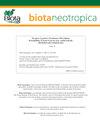动物学暑期课程的十年:巴西第一所大学动物学扩展课程的印象和影响
IF 1.2
4区 环境科学与生态学
Q3 BIODIVERSITY CONSERVATION
引用次数: 0
摘要
尽管分布在巴西的动物群体的多样性提供了无数的研究机会,但目前的情况并没有遵循这一需求。造成这种脱节的原因包括教学和研究资源的不平等,以及研究人员对特定动物群体的关注,而其他动物群体则被忽视。培训对动物学感兴趣的新的潜在巴西研究人员对于更好地了解这种多样性以及使这些潜在的新研究人员接触新的群体和不同的工作可能性至关重要。因此,在过去的十年中,由圣保罗大学动物学研究生项目推动的动物学暑期课程(葡萄牙语,CVZoo)一直在寻求为动物学领域的新研究人员的培训做出贡献,并通过大学推广活动更新教师。为了评估CVZoo对参与者的学术和专业培训造成的影响,我们向课程的十个版本的参与者发送了谷歌表格,并在拿latte平台上提供了汇编的信息。定性和定量分析显示了毕业生的概况、他们的期望以及对这门课程的看法。基于这些数据,我们证明了CVZoo在全国推广动物学方面的效率,有助于知识的分散化,以及满足知识获取更加平等和社会公平的迫切关注。本文章由计算机程序翻译,如有差异,请以英文原文为准。
A decade of Zoology Summer Course: impressions and impacts of the first university extension course on Zoology in Brazil
Abstract Although the diversity of animal groups distributed in Brazil provides countless research opportunities, the current scenario does not follow this demand. The reasons for the disconnections range from inequality in the availability of resources for teaching and research to the focus of researchers on specific groups of animals, while others remain neglected. Training new potential Brazilian researchers interested in Zoology is essential for a greater understanding of this diversity, as well as exposing those potential new researchers to new groups and different work possibilities. Thus, the Summer Course in Zoology (in Portuguese, CVZoo) promoted by the Graduate Program in Zoology at the University of São Paulo, over the last ten years, has been seeking to contribute to this training of new researchers in the field of Zoology, as well as in updating teachers through university extension activities. In order to assess the impacts caused by CVZoo on the academic and professional training of the participants, Google forms were sent to participants in the ten editions of the course, as well as compiled information available on the Lattes Platform. Qualitative and quantitative analyses showed the profile of graduates, their expectations, and perceptions about the course. Based on these data, we demonstrate the CVZoo’s efficiency in popularizing Zoology throughout the country in contributing to the decentralization of knowledge as well as in meeting the urgent concerns of making access to knowledge more egalitarian and socially fair.
求助全文
通过发布文献求助,成功后即可免费获取论文全文。
去求助
来源期刊

Biota Neotropica
BIODIVERSITY CONSERVATION-
CiteScore
2.90
自引率
16.70%
发文量
0
审稿时长
4-8 weeks
期刊介绍:
BIOTA NEOTROPICA is an electronic, peer-reviewed journal edited by the Program BIOTA/FAPESP: The Virtual Institute of Biodiversity. This journal"s aim is to disseminate the results of original research work, associated or not to the program, concerned with characterization, conservation and sustainable use of biodiversity within the Neotropical region.
Manuscripts are considered on the understanding that their content has not appeared, or will not be submitted, elsewhere in substantially the same form, because once published their copyrights are transferred to BIOTA NEOTROPICA as established in the Copyright Transfer Agreement signed by the author(s).
 求助内容:
求助内容: 应助结果提醒方式:
应助结果提醒方式:


